

Grist - Cities. Cities Without public transit, New York would have to build nearly 50 multi-lane bridges to accommodate its commuters.
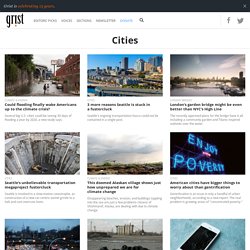
Yikes. burnin' rubber A Michigan bill aims to classify fuel made by burning tires and hazardous industrial waste as renewable energy, but environmentalists say that's setting a dangerous precedent. Business & Technology Uber, I loved you, but your disregard for women's safety is bringing me down. Grist - Climate & Energy. Weak ass on coal ash With weak rules for coal ash, Obama has rewarded his enemies, screwed over his friends, and squandered an opportunity to move toward clean energy.
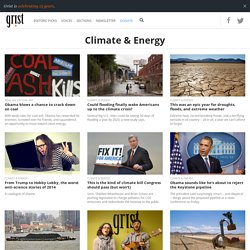
Climate & Energy Several big U.S. cities could be seeing 30 days of flooding a year by 2020, a new study says. Extreme heat, record-breaking floods, and a terrifying tornado in oil country -- all in all, a year we can't afford to forget. Grist - Food. Politics From school lunches to GMOs to cow farts, the effort to fund the federal government came with more than its share of food-related compromises and regulatory trimming.

Food When a group of government-appointed nutritionists tried to warn Americans that their eating choices have consequences, lawmakers bit back. Wasting less where food is produced is not only good for the planet, but it also helps reduce poverty -- the best way to get at hunger. Naomi Klein on why low oil prices could be a great thing.
May Boeve, executive director of 350.org, recently interviewed Naomi Klein, activist and author of the book This Changes Everything: Capitalism vs. the Climate (and a 350 board member), as part of a web workshop ahead of Global Divestment Day.
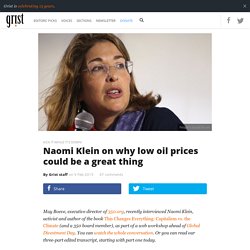
You can watch the whole conversation. Or you can read our three-part edited transcript, starting with part one today. May Boeve: There’s a lot of talk right now in the news about falling oil prices. Can you speak to the role that falling oil prices play in energy and climate politics in particular, and what we should be thinking about in this moment? Naomi Klein: That’s something I’ve been thinking a lot about, because the book I wrote before was called The Shock Doctrine, and the message of that book was that these moments are often catalysts for the wrong kind of change. If we do nothing, then it’s more likely that low oil prices will work against sensible climate action, just for simple economic reasons.
[Look at this recent] Economist cover. Life on Earth now officially at risk, scientists say. Humans are “eating away at our own life support systems” at a rate unseen in the past 10,000 years by degrading land and freshwater systems, emitting greenhouse gases, and releasing vast amounts of agricultural chemicals into the environment, new research has found.
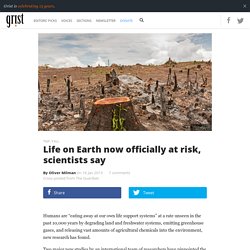
Two major new studies by an international team of researchers have pinpointed the key factors that ensure a livable planet for humans, with stark results. Of nine worldwide processes that underpin life on Earth, four have exceeded “safe” levels — human-driven climate change, loss of biosphere integrity, land system change, and the high level of phosphorus and nitrogen flowing into the oceans due to fertilizer use. Researchers spent five years identifying these core components of a planet suitable for human life, using the long-term average state of each measure to provide a baseline for the analysis. All of these changes are shifting Earth into a “new state” that is becoming less hospitable to human life, researchers said. Is “resilience” the new sustainababble? Suddenly, “resilience” is everywhere.
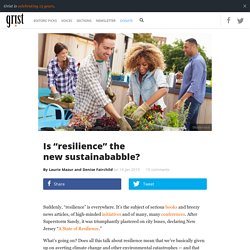
It’s the subject of serious books and breezy news articles, of high-minded initiatives and of many, many conferences. After Superstorm Sandy, it was triumphantly plastered on city buses, declaring New Jersey “A State of Resilience.” What’s going on? Does all this talk about resilience mean that we’ve basically given up on averting climate change and other environmental catastrophes — and that our only hope is to roll with the punches? Have we leapfrogged over denial, anger, and bargaining, landing squarely in acceptance? Not necessarily. A truly resilient city would look very different from those we now inhabit — in ways that would make Grist readers proud.
Or at least that’s what resilience should mean. Now the co-opters are hard at work on “resilience.” Aside from out-and-out co-optation, there is a danger that resilience will be defined too narrowly, and deprived of its power to transform.